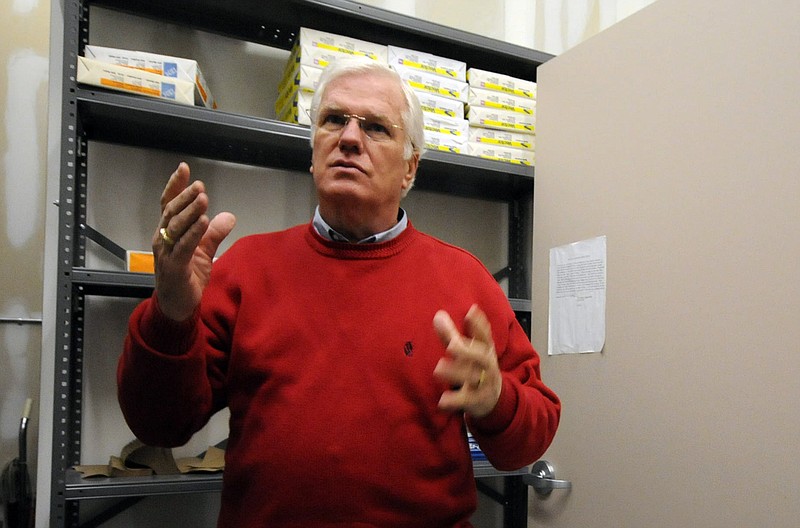By the numbers
Impact of the cuts to veterans property tax program:Location, home value, 2014, 2015Unincorporated county, $250,000, $518, $1,036Chattanooga, $250,000, $951, $1,902
Veterans groups across Tennessee are fuming over changes to a property tax relief program for totally disabled veterans and elderly residents that will increase taxes this year for some homeowners - and double taxes for others.
But local and state officials hope this will be the only year affected veterans and seniors will have to endure larger tax bills.
Since 1973, veterans who were completely disabled during service, their surviving spouses and other Tennesseans who are elderly or completely disabled could get state help paying their property taxes. The state would pay tax on the first $175,000 of appraised value on veterans' homes, and on the first $25,000 of homes owned by the elderly or disabled.
But starting July 1, the subsidy limit will be capped at $100,000 for veterans and $23,000 for the elderly or disabled.
And new enrollees will face income caps. Completely disabled veterans with household incomes of $60,000 a year or more and seniors with incomes above $28,690 will not qualify. Those already enrolled in the program are not subject to the income limit.
In Hamilton County, the change will mean a completely disabled veteran who owns a $250,000 house in the unincorporated county will see his or her 2015 tax bill double, from $518 in 2014 to $1,036.
A disabled veteran in Chattanooga with a similar home will go from paying $951 in 2014 to $1,902 in 2015.
The changes came because Gov. Bill Haslam's office found the subsidy program unaffordable, according to comptroller spokesman John Dunn. The state passed the "Save the Tax Relief Act," which included the changes, this year to shore up the program's finances, he said.
"Changes outlined in the act will sustain the program to allow more than 140,000 Tennesseans to benefit from the $35 million in state funding that has been set aside for this important program," Dunn said.
A NEW SOLUTION
But Hamilton County Trustee Bill Hullander said he's talking with state legislators about grouping veterans and the elderly/disabled into separate programs in hopes of tapping federal dollars for the veterans. That could benefit both groups, he said.
"I would think the state might could get some federal help with the veterans. If they could, this could maybe only be a one-year thing," Hullander said.
Trustee reports show 3,338 county residents are on the program, and 355 of those are disabled veterans or their widows.
The comptroller's office says about 9,100 households will be affected by the changes, and about 8,000 of them are disabled veterans or their spouses. Veterans whose homes are valued at or less than $100,000 will see no impact. The same goes for elderly or disabled people whose homes are valued at less than $23,000.
State Rep. Patsy Hazlewood, R-Signal Mountain, said she has got people researching the issue and hopes to have a few solutions by next session.
Hazlewood sits on the General Assembly's Budget and Finance Committee and played a role in the changes.
She said the Legislature tried to spread the burden so it didn't fall on just one group, but she hopes the state can do better next year.
"We all appreciate their service and their sacrifice, but it's a state program that's not in any way aided by the [federal government.] It's a question of revenue, and that's fixed," Hazlewood said.
Sen. Bo Watson, R-Hixson, said the state Senate is working to help, too.
"I think the Senate, we have members there who are interested in trying to work on a better solution if one exists," Watson said. "We have a commitment among members of the Senate to fund it in a better way."
VETERAN RESPONSE
Kevin Walden, president of the state's County Veterans Service Officers Association, said something needs to be done, because completely disabled veterans are some of the state's most vulnerable residents, financially and physically.
"These are only benefits that are due to veterans who are 100 percent disabled. They are in bad shape. Why do you want to hurt the worst those who are already hurting the worst? And to make it a money issue is crazy," Walden said.
Completely and permanently disabled veterans have been so injured that they are unlikely to ever seek, find or be capable of gainful employment, he said.
Ralph Land, legislative director for Disabled American Veterans of Tennessee, said the state is fleecing a group that actually brings a great deal of cash to the Volunteer State.
In fiscal year 2014, the 506,340 veterans in Tennessee collected $3.8 billion in U.S. Department of Veterans Affairs funding. In 2013, the figure was around $3.3 billion.
Land argues the state is seeing benefit from that through sales tax.
"That's $332 million just right off the top that the veterans are giving to the state of Tennessee on the benefits they are getting," Land said. "The whole budget is $30 billion, so last year we brought in [1 percent] of the budget in the state of Tennessee."
Contact staff writer Louie Brogdon at lbrogdon@timesfreepress.com, @glbrogdoniv on Twitter or at 423-757-6481.
